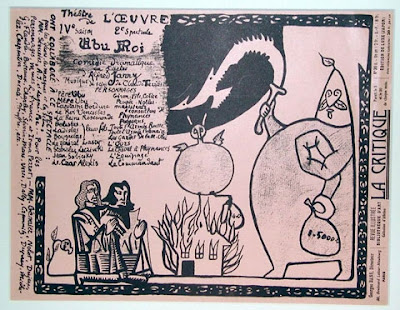Alfred Jarry, Lithographic cover for one of three issues of Répertoire des Paintins, executed at the time of the 1898 marionette revival of Ubu Roi at composer Claude Terrasse's Théâtre des Pantins, Paris.
I can still hear my mother telling me sadly: “You know, my little one, he is dead, thepoor man.” And we really felt the hurtof it, it was my first real grief. Forhe was a most charming companion to us children.
I knownothing of Jarry the man of letters, whom so many others knew. But the simple, kind and childlike Jarry, thefriend to children, deserves to be remembered. This was the Jarry I knew, the one who spoke to children with the heartof a child.
Alfred Jarry in 1903-4
First ofall, there was the Théâtre des Pantins, at 6, Rue Ballu, near the PlaceBlanche. To the small children we thenwere, my brother Jean and I, this theater was a place full of enchantment, aforbidden paradise. It was there, at thetable, that I so often picked up and played with those puppets whichrepresented Père Ubu, Mère Ubu, the Palotins, and especially, the Bear.
Pierre Bonnard: Claude Terrasse and his two sons, Jean andCharles, 1903. Bonnard, who designed the original Ubu Roi set and two years later with Jarry, its marionette cast, was Claude Terrasse's brother-in-law and uncle to his memoirist son.
I oftensaw them sitting around this table, sorting out the puppets, or repairing them,or just talking. Firstly there was UnclePierre, Pierre Bonnard, here the puppet maker but otherwise, because he was ofcourse a painter, it was he who had decorated the theater. Then my father and Franc-Nohain, FerdinandHerold, and finally, he who I never heard called anything except Père Ubu, butwhom I called, using the familiar “tu,”just plain Alfred: Alfred Jarry.
Pierre Bonnard, Self-Portrait, 1906.
Onenight he provoked my father into a duel. A duel with gruyere and red wine. Who could finish first, eating three or four ounces of gruyere cut intotiny pieces, or drinking a glass of wine, both with a teaspoon. Neither one of them managed it, they bothlaughed so much, the one at the sight of the other swallowing, the otherbecause he could no longer swallow at all.
Another of the three issues of Répertoire des Paintins withAlfred Jarry lithographic cover, 1898.
Hetaught me many things. He remembered somuch from his school days. And it was hewho taught me my first word of Latin, and, by repeating it the way he said it,I can still remember it the way he said it: T-A ta B-E-R taber N-A taberna C-U cu nacu bernacu tabernacu L-O loculo naculo bernaculo tabernaculo R-U-M rum lorum culorum naculorum bernaculorum tabernaculorum. It has to be said all in one breath.
Alfred Jarry, Ubu letterhead design for Théâtredes Pantins, 1898.
Healways seemed the same, a kindly man, who rarely laughed, but who was never moroseeither, although he was sometimes a little sarcastic, but he always regarded mewith a beautiful smile, and whenever I approached him he would always depositon my forehead his little mechanical kiss.
Page from the original theatrical program for Ubu Roi, performed one time only on December 10, 1896.
NOTES:
1. “After us, the Savage God” -- William Butler Yeats, after attending the premiere performance ofAlfred Jarry’s Ubu Roi, Théâtre de l’OEuvre,Paris, December 10, 1896, which resulted in a riot and the banning of the play.
2. Charles Terrasse's moving anecdotes above are excerpted from Alastair Brotchie's essential and highly recommended Alfred Jarry, A Pataphysical Life , published 2011 by MIT Press, Cambridge, Massachusetts.








No comments:
Post a Comment